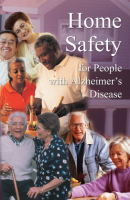We all need to communicate with other people. Communicating our needs, wishes and feelings is vital − not only to improve our quality of life, but also to preserve our sense of identity. If you need to communicate with someone with dementia, it’s important to encourage the person to do so in whichever way works best for them.
We tend to think of communication as talking, but in fact it consists of much more than that. As much as 90 per cent of our communication takes place through non-verbal communication, such as gestures, facial expressions and touch.
Non-verbal communication is particularly important for a person with dementia who is losing their language skills. What is more, when a person with dementia behaves in ways that cause problems for those caring for them, it is important to realise that they may be trying to communicate something.
Dementia and Language
An early sign that someone’s language is being affected by dementia is that they can’t find the right words − particularly the names of objects. The person may substitute an incorrect word, or may not find any word at all.
There may come a time when the person can hardly communicate through language at all. Not only will they be unable to find the words of objects: they may even forget the names of friends and family. People with dementia often confuse the generations − mistaking their wife for their mother, for example. This may be very distressing for their loved ones, but it’s a natural aspect of their memory loss.
The person with dementia may be trying to interpret a world that no longer makes sense to them because their brain is processing information incorrectly. Sometimes the person with dementia and those around them will misinterpret each other’s attempts at communication. These misunderstandings can be difficult, and may require some support.
Difficulties with communication can be upsetting and frustrating for the person with dementia and for those around them, but there are lots of ways to help make sure that you understand each other.
Tips: Communicating with Someone with Dementia
General advice
- Listen carefully to what the person has to say.
- Make sure you have their full attention before you speak.
- Pay attention to body language.
- Speak clearly.
- Think about how things appear in the reality of the person with dementia.
- Consider whether any other factors are affecting communication.
- Use physical contact to reassure the person.
- Show respect and patience, remember it may take longer for the brain to process the information and respond.
Listening skills
- Try to listen carefully to what the person is saying, and give them plenty of encouragement.
- If the person has difficulty finding the right word or finishing a sentence, ask them to explain in a different way. Listen out for clues.
- If you find the speech hard to understand, use what you know about the person to interpret what they might be trying to say. But always check back to see if you are right − it’s infuriating to have your sentence finished incorrectly by someone else!
- If the person is feeling sad, let them express their feelings without trying to ‘jolly them along’. Sometimes the best thing to do is to just listen, and show that you care.
Attracting the person’s attention
- Try to catch and hold the attention of the person before you start to communicate.
- Make sure they can see you clearly.
- Make eye contact. This will help them focus on you.
- Try to minimise competing noises, such as the radio, TV, or other people’s conversation.
Using body language
- A person with dementia will read your body language. Agitated movements or a tense facial expression may cause upset or distress, and can make communication more difficult.
- Be calm and still while you communicate. This shows the person that you are giving them your full attention, and that you have time for them.
- Never stand over someone to communicate: it can feel intimidating. Instead, drop below their eye level. This will help the person to feel more in control of the situation.
- Standing too close to the person can also feel intimidating, so always respect their personal space.
- If words fail the person, pick up cues from their body language. The expression on their face, and the way they hold themselves and move about, can give you clear signals about how they are feeling.
Speaking clearly
- As the dementia progresses, the person will become less able to start a conversation, so you may have to start taking the initiative.
- Speak clearly and calmly. Avoid speaking sharply or raising your voice, as this may distress the person even if they can’t follow the sense of your words.
- Use simple, short sentences.
- Processing information will take the person longer than it used to, so allow enough time. If you try to hurry, they may feel pressured.
- Avoid asking direct questions. People with dementia can become frustrated if they can’t find the answer, and they may respond with irritation or even aggression. If you have to, ask questions one at a time, and phrase them in a way that allows for a ‘yes’ or ‘no’ answer.
- Try not to ask the person to make complicated decisions. Too many choices can be confusing and frustrating.
- If the person doesn’t understand what you are saying, try getting the message across in a different way rather than simply repeating the same thing.
- Humour can help to bring you closer together, and is a great pressure valve. Try to laugh together about misunderstandings and mistakes − it can help.
Whose reality?
- As dementia progresses, fact and fantasy can become confused. If the person says something you know isn’t true, try to find ways around the situation rather than responding with a flat contradiction.
- If the person says ‘We must leave now − Mother is waiting for me’, you might reply, ‘Your mother used to wait for you, didn’t she?’
- Always avoid making the person with dementia feel foolish in front of other people.
Physical contact
- Even when conversation becomes more difficult, being warm or affectionate can help carers to remain close to their loved ones, or for the person with dementia to feel supported.
- Communicate your care and affection by the tone of your voice and the touch of your hand.
- Don’t underestimate the reassurance you can give by holding or patting the person’s hand or putting your arm around them, if it feels right.
Show respect
- Make sure no one speaks down to the person with dementia or treats them like a child, even if they don’t seem to understand what people say. No one likes being patronised.
- Try to include the person in conversations with others. You may find this easier if you adapt the way you say things slightly. Being included in social groups can help a person with dementia to preserve their fragile sense of their own identity. It also helps to protect them from overwhelming feelings of exclusion and isolation.
- If you are getting little response from the person, it can be very tempting to speak about the person as if they weren’t there. But disregarding someone in this way can make them feel very cut off, frustrated and sad.
Other Causes of Communication Difficulty
It is important to bear in mind that communication can be affected by other factors in addition to dementia − for example:
- pain, discomfort, illness or the side-effects of medication. If you suspect this might be happening, talk to the person’s GP at once
- problems with sight, hearing or ill-fitting dentures. Make sure the person’s glasses are the correct prescription, that their hearing aids are working properly, and that their dentures fit well and are comfortable.

Factsheet 500
For details of Alzheimer’s Society services in your area, visit alzheimers.org.uk/localinfo
For information about a wide range of dementia-related topics, visit alzheimers.org.uk/factsheets
Last updated: May 2010
Reviewed by Cathy Baldwin, Programme Delivery Manager, Knowledge and Learning, Alzheimer’s Society


















